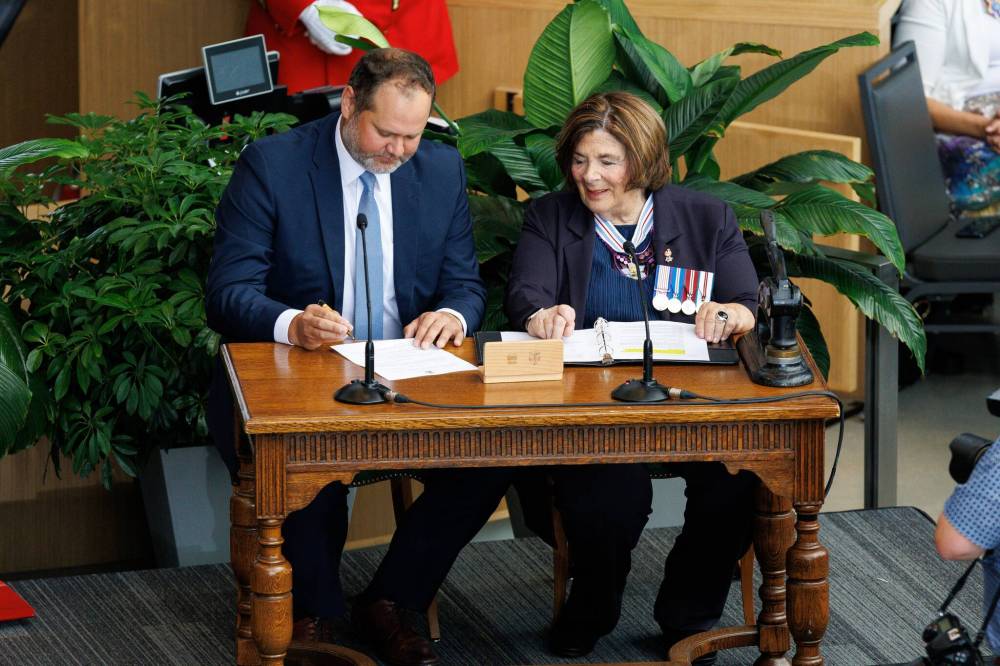Manitoba court system delays a priority for new justice minister
Advertisement
Read this article for free:
or
Already have an account? Log in here »
To continue reading, please subscribe:
Monthly Digital Subscription
$0 for the first 4 weeks*
- Enjoy unlimited reading on winnipegfreepress.com
- Read the E-Edition, our digital replica newspaper
- Access News Break, our award-winning app
- Play interactive puzzles
*No charge for 4 weeks then price increases to the regular rate of $19.00 plus GST every four weeks. Offer available to new and qualified returning subscribers only. Cancel any time.
Monthly Digital Subscription
$4.75/week*
- Enjoy unlimited reading on winnipegfreepress.com
- Read the E-Edition, our digital replica newspaper
- Access News Break, our award-winning app
- Play interactive puzzles
*Billed as $19 plus GST every four weeks. Cancel any time.
To continue reading, please subscribe:
Add Free Press access to your Brandon Sun subscription for only an additional
$1 for the first 4 weeks*
*Your next subscription payment will increase by $1.00 and you will be charged $16.99 plus GST for four weeks. After four weeks, your payment will increase to $23.99 plus GST every four weeks.
Read unlimited articles for free today:
or
Already have an account? Log in here »
Hey there, time traveller!
This article was published 18/10/2023 (785 days ago), so information in it may no longer be current.
Addressing delays in Manitoba’s justice system is among the “first priority” issues for the province’s new justice minister, as the provincial court faces a backlog of cases, including waits of years, in some cases, for inquests to take place.
Matt Wiebe, the MLA for Concordia since 2010, was sworn in Wednesday as minister of justice and attorney general, along with 13 other new cabinet ministers and Premier Wab Kinew, at a ceremony at The Leaf in Assiniboine Park. Wiebe was previously the NDP’s justice critic.
“With regards to timely access to justice, I think it’s an important issue… across the justice system,” he told the Free Press following the swearing-in. “We’ve seen some serious delays in justice that, quite frankly, need to be addressed.”

MIKE DEAL / WINNIPEG FREE PRESS
Matt Wiebe takes the oath of office from Lt.-Gov. Anita Neville, becoming minister of justice and attorney general, keeper of the great seal of the province of Manitoba, minister responsible for the Manitoba Public Insurance Corporation
The NDP’s election campaign, which largely focused on promises around health care, did not delve deeply into issues with Manitoba’s courts. For instance, a July report by Manitoba’s auditor general noted that staffing shortages, particularly in Northern Manitoba, were hurting the court’s operations and though the court’s “time to disposition” — a measurement of how long cases take to be concluded — had decreased, it remained high.
A recent four-month investigation by the Free Press found inquests in Manitoba have been — and continue to be — subject to lengthy delays. The investigation, which focused on inquests into the deaths of Manitobans who were shot and killed by police over the last 20 years, detailed several inquests that took upwards of eight years to complete. (Twenty-nine Manitobans have been fatally shot by police since 2003.)
The issue of inquest delays has only grown since the COVID-19 pandemic put a squeeze on court operations. By spring 2022, faced with a deluge of backlogged criminal cases and a shortage of resources, the provincial court put a pause on scheduling inquests. That moratorium stretched for well over a year.
Under the previous PC government, the province rejected two recommendations — made in a 2017 inquest — intended to address inquest delays. They included creating legislative timelines under which inquests must proceed and reinstating an inquest co-ordinator.
When inquests finally do take place, families’ access to legal counsel is also an issue. Since 2003, 14 inquests have been held regarding fatal shootings by police; only about half of the victims’ families had legal representation.
“We’ve seen some serious delays in justice that, quite frankly, need to be addressed.”–Matt Wiebe
While the province has a program where families can apply to receive financial assistance in retaining counsel for an inquest, out of 10 applications since 2017, just five were approved.
Among those denied was Vivian Caron. After her son, Evan Beardy Caron, was shot and killed by a Winnipeg police officer in 2017, Caron’s then-lawyer applied for assistance. They were told by the director of Manitoba Justice’s legal services branch that the “interests of justice” did not require the province to contribute to Caron’s legal expenses. She’s since gone without a lawyer. The inquest into Evan’s death is scheduled for January.
Asked about access to counsel for families at inquests, including in Caron’s case, Wiebe noted he wanted to delve into his file before providing more specific answers, but said making sure that families interacting with the justice system are supported is “a big part of what we need to get right.”
“It’s something that I think there’s been some failures in the province — under the PC government over the last seven years — so I’m eager to get to work on that.”
marsha.mcleod@freepress.mb.ca
“It’s something that I think there’s been some failures in the province — under the PC government over the last seven years — so I’m eager to get to work on that.”–Matt Wiebe

Marsha McLeod
Investigative reporter
Signal
Marsha is an investigative reporter. She joined the Free Press in 2023.
Our newsroom depends on a growing audience of readers to power our journalism. If you are not a paid reader, please consider becoming a subscriber.
Our newsroom depends on its audience of readers to power our journalism. Thank you for your support.












